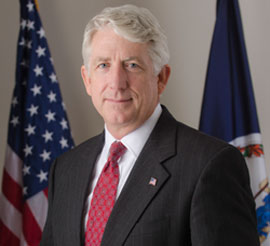Michael Bloomberg’s plan to use an environmental law clinic at NYU to place environmentalist lawyers in friendly state attorneys general offices has hit a roadblock in Virginia. On Wednesday, the Competitive Enterprise Institute sued Virginia Attorney General Mark Herring (D) for records about his office’s claim that they could legally bring on board a special assistant attorney general paid for by an activist donor.
At the heart of the case is the State Impact Center at NYU, which was founded to “enable interested state attorneys general to expand their capacity to take on important clean energy, climate, and environmental matters.” It is funded by Bloomberg, whose money pays to recruit and hire attorneys to serve as special assistant attorney generals in certain states.
The goal of the program is specifically to support attorneys general who want to go after energy, climate, and environmental cases, but currently lack the staff. The trouble is, the arrangement may be illegal under Virginia state law, which in turn brings into question why Herring told the State Impact Center the opposite.
“Given the apparent prohibitions in the Virginia code against this arrangement, not to mention due process concerns, it is inconceivable the Commonwealth’s top legal office claimed authority to do this without considering whether it’s legal,” said CEI senior fellow Chris Horner, who submitted the requests for CEI. “We seek confirmation if this is the case and to find out how the OAG could claim to have ‘no records’ responsive to these requests.”
At the heart of the lawsuit are four statutes governing how state agencies employ personnel. State law specifies that agencies, including the attorney general’s office, must employ the personnel working for them, paying these staff from the state treasury. Although the office may hire private special counsel when necessary due to geography or specialized knowledge, the office is required to first provide a written explanation of why this additional staff is necessary.
When applying for the special assistant attorney general, Herring’s office had to certify that it had the legal authority to bring on non-employee attorneys. They also had to certify that the arrangement would not violate regulations governing gifts or professional responsibility. CEI has previously filed Freedom of Information Act Requests with the AG’s office seeking memos or other records about how the office reached this conclusion.
CEI was told that the office of the attorney general had no records showing that it had produced any analysis, opinion, or conclusion supporting its legal assertions.
“Given the apparent prohibitions in the Virginia code against this arrangement, not to mention due process concerns, it is inconceivable the Commonwealth’s top legal office claimed authority to do this without considering whether it’s legal,” said Horner. “We seek confirmation if this is the case and to find out how the OAG could claim to have ‘no records’ responsive to these requests.”
Herring’s office applied for and accepted the offer of a special assistant attorney general funded by Bloomberg. They even went as far as to settle on an $81,500-salary for the position. However, the agreement was never consummated, perhaps because CEI began asking questions.
CEI hopes that the lawsuit will push Herring’s office to explain how it reached the conclusion–seemingly without any creating any internal documents or analyses–that the arrangement was legal under Virginia and, why, after that, no person was ever seated in the role.
A email to Herring’s office seeking comment was not answered by press time.

